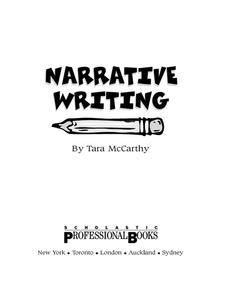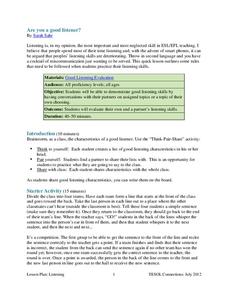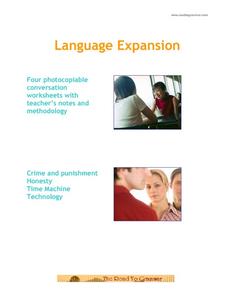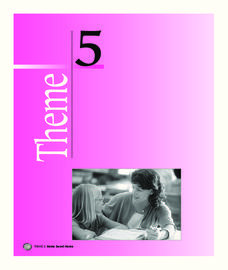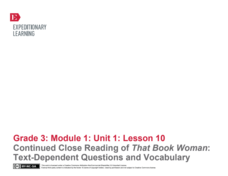EngageNY
End of Unit Assessment, Part III: Storyboard Draft, Section 4
Reflection is the best teacher. Using the resource, scholars complete the final part of their end of unit assessment, the fourth section of their storyboard about an invention. Next, they track their progress using a self-reflection...
Scholastic
Narrative Writing
If you're looking to start a unit based around narrative writing, make sure to consider this resource while you're planning. This book covers five topics: writing personal narratives, writing narratives about others, writing...
Houghton Mifflin Harcourt
We Can Do It!: Extra Support Lessons (Theme 10)
Scholars participate in chants, grand discussions, and complete practice pages in a We Can Do It! themed unit. Designed to provide extra support, the assortment of lessons cover topics such as r-controlled vowels, comparatives...
TESOL
Are You a Good Listener?
Your learners talk to each other every day, but are they really listening? Use a lesson based on listening skills to ensure that class members feel heard and respected. It includes games, discussion topics, and self-assessment tools...
Road to Grammar
Language Expansion
Improve your pupils' language skills with these discussions and activities. There are four topics included here, and each is paired with discussion prompts (small group and whole class), student handouts, and teacher notes. After...
Saskatchewan Elocution and Debate Association
Grab ‘N Go Debate
Here's a resource that provides debaters with the background information and worksheets they will need when planning a policy debate. Templates and sentence frames, as well as a rationale for using debates in the classroom, are...
Curated OER
Teaching Debate to ESL Students
Language learners use the debate format to practice formulating, expressing, and defending their ideas. Working in teams, class members develop resolutions, use opinion indicators to express their opinions and reasons, and prepare...
EngageNY
Equivalent Ratios
Equivalent ratios show up on tape. Young mathematicians use tape diagrams to create equivalent ratios in the initial lesson on the topic. They learn the definition of equivalent ratios and use it to build others in the third segment of a...
EngageNY
Continued Close Reading of Bullfrog at Magnolia Circle: Text-Dependent Questions and Vivid Words and Phrases
As 3rd graders continue reading Bullfrog at Magnolia Circle, they focus on the concepts of predator and prey in the fifth lesson plan of this unit. Scholars further develop their ability to answer questions using evidence from the text...
Curated OER
Identify Healthy Food and Lifestyle Choices
Poll your scholars about their choices on food they eat, or don't eat, and on maintaining a healthy lifestyle. Topic statements such as "I ate breakfast this morning" start a discussion on what are healthy choices and what are unhealthy...
Curated OER
What Are the Advantages and Disadvantages of Conforming?
Dive into Arthur Miller’s The Crucible and determine what it means to conform in society, and discuss as a group with the thoughts and plans available in these documents. Included are multiple activities and brain targets that form the...
My Access
“Banning Books” Lesson Plan
To Kill a Mockingbird, Hunger Games, Brave New World. Welcome to Banned Books Week. As part of a study of censorship and book banning, class members investigate censorship, the purposes of censorship, and First Amendment rights,...
Houghton Mifflin Harcourt
Home Sweet Home: Extra Support Lessons (Theme 5)
Home Sweet Home is the theme of a unit comprised of extra support lessons. Scholars reinforce concepts through chants, grand discussions, and practice worksheets. Topics include digraphs, blending phoneme, long vowels, final sounds,...
The New York Times
News and News Analysis: Navigating Fact and Opinion in the Times
Help your class understand the difference between fact and opinion by exploring the New York Times homepage and articles. In pairs or small groups, pupils complete a scavenger hunt, answering the provided questions. Next, discuss the...
APlusPhysics
Generate an Argument: Indian Point Nuclear Plant
Small groups in your physics class collaborate on researching and forming an opinion on whether or not to continue operating the Indian Point nuclear power plant in New York. Once the information is gathered and an argument developed,...
Curated OER
Nonfiction Genre Mini-Unit: Persuasive Writing
Should primary graders have their own computers? Should animals be kept in captivity? Young writers learn how to develop and support a claim in this short unit on persuasive writing.
Forest Foundation
Fire Investigation and Experimentation
Assess the probability of a wildfire with several lessons about fire danger ratings and risk factors. After experimenting with fuel moisture, learners explore the various elements that could contribute to a wildfire, such as wind...
Brigham Young University
Rosencrantz and Guildenstern Are Dead: Fishbowl Discussion
After reading through Act II of Rosencrantz and Guildenstern Are Dead, take some time to discuss the references to death in the play. For this fishbowl discussion, learners prepare questions, practice answering individually and with...
Computer Science Unplugged
Tablets of Stone—Network Communication Protocols
Show your learners that the game of Telephone isn't the only way messages get mixed up. Pairs transform into the sender and receiver of a message sent in packets. At least one pupil is the messenger who either delivers, delays, or...
EngageNY
Writing Equations Using Symbols
Build upon prior equation writing experience to create more complicated equations. Lesson one in a 33-part unit builds upon the class members' sixth and seventh grade experience of writing linear equations. Several examples...
CC Homestead
Summarize
Designed for third graders but appropriate for older learners as well, this packet of materials underscores the necessity of teaching kids how to summarize, how to identify main ideas and supporting details, and how to ask questions...
EngageNY
Continued Close Reading of Rain School: Text-Dependent Questions and Vocabulary
The engaging story Rain School is further explored in the third lesson of a larger unit that explicitly teaches close reading skills by answering questions whose answers can only be found inside the text. Through teacher...
EngageNY
Continued Close Reading of That Book Woman: Text-Dependent Questions and Vocabulary
Explicitly explained and delightfully detailed are two ways to describe this tenth lesson plan in a larger unit designed for the first few weeks of third grade. Learners continue to use and develop previously learned close reading...
EngageNY
Continued Close Reading of Nasreen's Secret School: Discussions of Questions and Evidence
Third graders answer text-dependent questions of the story Nasreen's Secret School both independently and then collaboratively through using the carousel of questions strategy. This plan is the seventh instructional activity in a...

